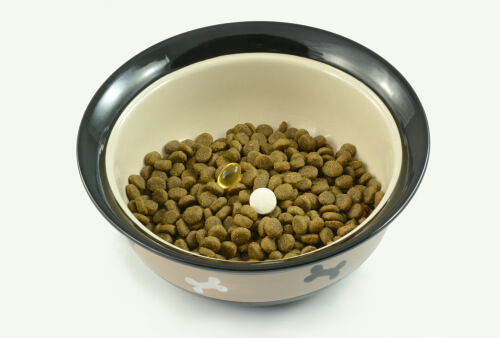Glucosamine for Dogs: Dosage and Benefits

When pets reach a certain age they begin to suffer from different illnesses, just as people do. Joint and cartilage problems are very common in old age, but the good news is that there are several treatments to help to relieve them. The most common is to use glucosamine for dogs. We’ll tell you more in this article.
Joint problems in dogs
Believe it or not, many dogs suffer from arthritis or osteoarthritis as they age. It’s a degenerative disease common in large breeds, such as the Great Dane or the German Shepherd.
With the passage of time, the cartilage becomes stiffer, thinner, and less able to cushion the movements. This leads to a lot of pain and a lack of mobility. The animal can’t and won’t get out of bed, play, or walk.
When cartilage degrades, the area around it becomes inflamed and puts more pressure on the joints, leading to more pain and less mobility. In addition, deteriorated cartilage is more prone to serious injury.

What is glucosamine for dogs?
The first thing to know about glucosamine is that it’s a compound that occurs naturally in the body and is present in cartilage. It’s composed of an amino acid called glutamine and glucose, and helps in the formation of cartilage cells.
However, when pets suffer from arthritis or osteoarthritis, the veterinarian will prescribe glucosamine treatment for dogs in supplement form.
There are three types of glucosamine for dogs in supplement form:
- Glucosamine sulfate: This is extracted from shellfish shells and contains sulfur.
- Glucosamine hydrochloride: This comes from other marine species and doesn’t contain sulfur.
- N-acetyl glucosamine: Derived from glucose, it helps produce synovial fluid to lubricate the joints.
This nutrient can also be found in certain foods, and so it’s essential for the pet to comply with a healthy and balanced diet at all ages.
Glucosamine treatments for dogs help to relieve joint pain, as well as to repair cartilage, reduce tension in tendons, and to treat hip dysplasia, arthritis, and spinal disc injuries.

In turn, glucosamine accelerates the recovery process after surgery involving joints, slows the aging of cartilage, improves the digestive system, and reduces irritable bowel syndrome.
Glucosamine for dogs: doses
This drug is available in different formats: powders, liquids, or tablets. The veterinarian will tell you which one is adequate according to the condition of the animal, because if the dog is very old and can’t chew well, it’ll be better to give them a syrup than a tablet.
In general, the administration of glucosamine for dogs is daily, divided into two doses every 12 hours or one every 24 hours, and the dose – prescribed by the doctor – will depend on the weight of the pet and how advanced the condition is. It’s normal to administer 20 milligrams of glucosamine sulfate for each kilogram (2.2 pounds) the dog weighs. This calculation should always be carried out by the vet.
You must take into account that, even though this treatment is effective in improving our furry friends’ lives to help them experience less pain, or even prevent the disease from advancing, they may also suffer some side effects. Among them, we can highlight fatigue, insomnia, and excessive thirst.
Glucosamine for dogs isn’t the solution to the problem of osteoarthritis or hip dysplasia, but it is true that it greatly improves the animal’s life. When the problem is detected early on, and treatment is followed to the letter, then it’s more likely that the pet will suffer less and be able to continue with their daily activities without too much pain.
When pets reach a certain age they begin to suffer from different illnesses, just as people do. Joint and cartilage problems are very common in old age, but the good news is that there are several treatments to help to relieve them. The most common is to use glucosamine for dogs. We’ll tell you more in this article.
Joint problems in dogs
Believe it or not, many dogs suffer from arthritis or osteoarthritis as they age. It’s a degenerative disease common in large breeds, such as the Great Dane or the German Shepherd.
With the passage of time, the cartilage becomes stiffer, thinner, and less able to cushion the movements. This leads to a lot of pain and a lack of mobility. The animal can’t and won’t get out of bed, play, or walk.
When cartilage degrades, the area around it becomes inflamed and puts more pressure on the joints, leading to more pain and less mobility. In addition, deteriorated cartilage is more prone to serious injury.

What is glucosamine for dogs?
The first thing to know about glucosamine is that it’s a compound that occurs naturally in the body and is present in cartilage. It’s composed of an amino acid called glutamine and glucose, and helps in the formation of cartilage cells.
However, when pets suffer from arthritis or osteoarthritis, the veterinarian will prescribe glucosamine treatment for dogs in supplement form.
There are three types of glucosamine for dogs in supplement form:
- Glucosamine sulfate: This is extracted from shellfish shells and contains sulfur.
- Glucosamine hydrochloride: This comes from other marine species and doesn’t contain sulfur.
- N-acetyl glucosamine: Derived from glucose, it helps produce synovial fluid to lubricate the joints.
This nutrient can also be found in certain foods, and so it’s essential for the pet to comply with a healthy and balanced diet at all ages.
Glucosamine treatments for dogs help to relieve joint pain, as well as to repair cartilage, reduce tension in tendons, and to treat hip dysplasia, arthritis, and spinal disc injuries.

In turn, glucosamine accelerates the recovery process after surgery involving joints, slows the aging of cartilage, improves the digestive system, and reduces irritable bowel syndrome.
Glucosamine for dogs: doses
This drug is available in different formats: powders, liquids, or tablets. The veterinarian will tell you which one is adequate according to the condition of the animal, because if the dog is very old and can’t chew well, it’ll be better to give them a syrup than a tablet.
In general, the administration of glucosamine for dogs is daily, divided into two doses every 12 hours or one every 24 hours, and the dose – prescribed by the doctor – will depend on the weight of the pet and how advanced the condition is. It’s normal to administer 20 milligrams of glucosamine sulfate for each kilogram (2.2 pounds) the dog weighs. This calculation should always be carried out by the vet.
You must take into account that, even though this treatment is effective in improving our furry friends’ lives to help them experience less pain, or even prevent the disease from advancing, they may also suffer some side effects. Among them, we can highlight fatigue, insomnia, and excessive thirst.
Glucosamine for dogs isn’t the solution to the problem of osteoarthritis or hip dysplasia, but it is true that it greatly improves the animal’s life. When the problem is detected early on, and treatment is followed to the letter, then it’s more likely that the pet will suffer less and be able to continue with their daily activities without too much pain.
All cited sources were thoroughly reviewed by our team to ensure their quality, reliability, currency, and validity. The bibliography of this article was considered reliable and of academic or scientific accuracy.
- Towheed, TE; Maxwell; L; Anastassiades, TP; Shea, B; Houpt, J; Robinson, V; Hochberg, MC; Wells, G. (2008). Terapia con glucosamina para el tratamiento de la osteoartritis (Revisión Cochrane traducida). Biblioteca Cochrane Plus.
- Fernández-Martín, S., González-Cantalapiedra, A., Muñoz, F., García-González, M., Permuy, M., & López-Peña, M. (2021). Glucosamine and Chondroitin Sulfate: Is There Any Scientific Evidence for Their Effectiveness as Disease-Modifying Drugs in Knee Osteoarthritis Preclinical Studies?—A Systematic Review from 2000 to 2021. Animals, 11(6), 1608.
- Beale, B. (2010). Artritis en gatos y perros: tratamientos. Banfield Journal, 1-16.
This text is provided for informational purposes only and does not replace consultation with a professional. If in doubt, consult your specialist.








